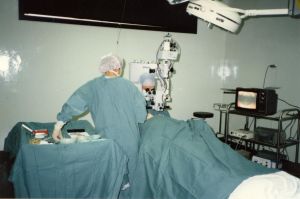A 53-year-old chemist and college instructor was diagnosed with fibroids earlier this year. Fibroids are very common among women and, while they can cause bleeding and pressure, fibroids are not generally considered dangerous and are benign growths. However, the patient was scheduled for a minimally-invasive hysterectomy in order to remove her uterus through a small incision as a method of treating the symptomatic fibroids. 
Her procedure was to involve the use of a morcellator. At the time, morcellators were widely used as a method of treating fibroids. The morcellators were used to slice up fibroids or tissue growths so the tissue could be removed in pieces through a smaller incision. However, the patient read about a debate among doctors in which some physicians were expressing growing concern about the use of this medical device. She raised her concerns with her doctor, who thought that the risk of complications was rare but who respected her position and performed a procedure removing her uterus vaginally without the use of the power morcellator.
The decision to voice her concerns may have saved her life. The Food and Drug Administration (FDA) has since issued an advisory warning of the risks of the use of morcellators and recommending against this method of treating fibroids. Lawsuits have also been filed by victims who were harmed by the use of a morcellator. A Boston defective medical device lawyer should be consulted by patients who are affected for help pursuing a claim for damages and losses.
Morcellator Could Cause Cancer to Spread
The patient who spoke out and asked her doctor not to use the morcellator turned out to have more than fibroids. Instead, when her pathology report came back, she was diagnosed with an endometrial stromal sarcoma, which is a type of uterine sarcoma. The FDA has estimated that around one in 350 women who are diagnosed with uterine fibroids actually have uterine sarcoma, or cancer. It is impossible to know when a woman has uterine sarcoma until after the tissue has been removed from the body.
When a morcellator is used in a patient with uterine sarcoma, the tissue that has the cancer cells may spread throughout the abdominal cavity and throughout the pelvis. This can cause the cancer to spread and it can make the patient’s long-term prognosis much worse than it would have been if the morcellator had not been used in the procedure.
As the Wall Street Journal reported, the FDA is now discouraging the use of power morcellators and is planning on holding a hearing this summer on the risks.
The doctor who performed the surgery on the patient who turned out to have cancer has changed his position and is no longer using a power morcellator at all. He believes that many patients would not accept the risks that the use of this device presents, if they are fully informed of the dangers. Using the morcellator would have saved around 30 minutes of surgery but could cost patients their lives.
If you are the victim of Massachusetts product liability, call Jeffrey Glassman Injury Lawyers for a free and confidential appointment — (617) 777-7777.
More Blog Entries:
TVM Company Facing Falling Revenues & Legal Trouble, Boston Product Liability Lawyer Blog, March 13, 2014
 Product Liability Lawyer Blog
Product Liability Lawyer Blog

